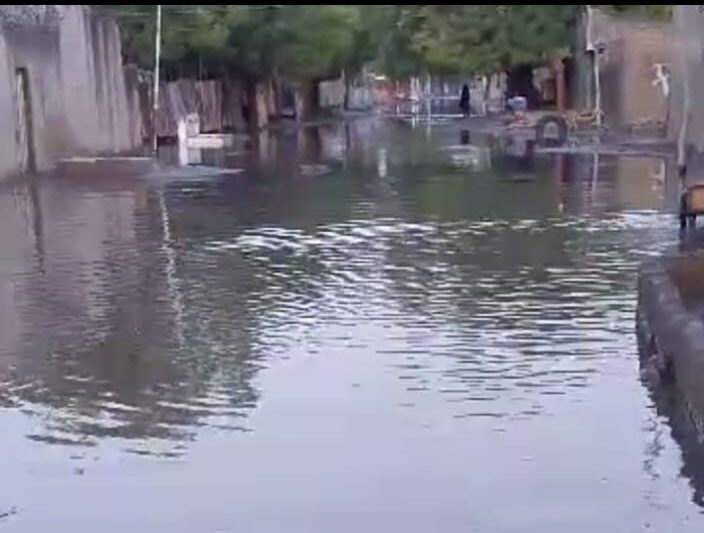Lashing rain has caused flooding in parts of Maiduguri, the capital of Borno State, forcing residents to flee their homes and to take shelter in neighbouring communities on higher ground.
Heavy downpours have caused flooding in parts of Maiduguri, the capital of Borno State, forcing residents to temporarily flee from their homes and seek shelter in neighbouring communities on higher ground.
Many houses and shops have been damaged in the flooding. Roads are submerged and there are large areas of dirty stagnant water.
Healthcare workers have warned that stagnant water could harbour harmful bacteria and other microorganisms, including viruses, parasites and fungi, which can cause gastrointestinal problems, such as diarrhoea, vomiting and abdominal pain if ingested.
The torrential rain has forced parents to keep their children from attending school.
The wet weather is set to continue. The Nigerian Meteorological Agency (NiMet) has predicted rain for much of the week.
NiMet’s weather forecast, released on Saturday, predicted thunderstorms and heavy rain over northern Nigeria, including in Gombe, Bauchi, Borno, Adamawa, Jigawa, Taraba and Kaduna states.
Residents of many suburbs in Maiduguri reported flooding. They said badly designed drainage systems and blockages had also caused sewers to flood.
“It is not safe for children to walk to school. It is not just the submerged roads. There are large pools of stagnant water that are a health risk,” said Bulama Ngubdo, a resident of Sulaimanti, a suburb of Maiduguri. “In the past, children have got sick from wading through filthy water.”
Ngubdo said his house was one of many that was flooded at the weekend.
“We were first displaced 10 years ago by armed men. Now heavy downpours have forced us from our home. My family and I were not even able to collect our valuables before we left the house.
“I was working at the market when it began to rain more heavily. As soon as the market closed, I hurried home to see if my wife and children were safe. But there was no one in the house and it was already flooded.
“The water was knee-deep and the toilet was overflowing.
“I was worried because I could not find my family anywhere. I asked my neighbours and they told me my wife and children had fled to a neighbouring community for safety. I went to search for them and luckily I found them. Now we have to stay away until the water subsides.”
Ngubdo said third-term examinations were just a few weeks away but he had been forced to keep his children from attending school because of the flooding.
“The school is far away and the roads are under water. I told my children that they will not be able to go to school until the water has subsided.
“From past experience, I know it takes days or even a week for the water to drain so I do not know how long the children will have to stay off school. If it starts raining heavily again, it could take even longer. I am concerned about my kids’ education. It is not good for them to miss school, particularly because of the upcoming examinations.
“My kids are too young to cross flooded roads. And I don’t want them to fall ill.”
Alhaji Chabiri Kolori, also a resident of Maiduguri, said he had also kept his children from attending school.
“I told them to stay at home because the road is flooded and it is not safe. There are many schoolchildren in this community but none has gone to school today. We don’t know when it will be safe for them to go. It depends how long the rain lasts and how long it takes for the water to drain.”
Kolori said the community had done what they could to ensure their houses would not flood, including using sandbags to prevent water coming into their homes.
“But the rain is heavy and our homes are flooding. It is beyond our control. Not even the sandbags are keeping the water out.”
“This is not the first time our children have been forced to skip classes. It happens frequently in the rainy season.”
AYSHA MUSTAPHA KOLOMI








